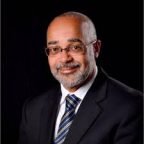
His Excellency Dr. Didacus Jules
Organisation of Eastern Caribbean States
Director General
His Excellency Dr. Didacus Jules assumed the post of Director General, of the Organisation of Eastern Caribbean States in May 2014. In this capacity he is responsible for driving the regional integration thrust towards a single economic and social space involving ten Eastern Caribbean States.
Dr. Jules had had extensive regional and international experience, most of it focused on education, social policy and organisational transformation. He served as Registrar and Chief Executive Officer of the Caribbean Examinations Council (2008-2014) leading a thorough modernization of the Council. He has also served as Vice President Human Resources Cable and Wireless St, Lucia (2005-2008); Permanent Secretary for Education & Human Resource Development St. Lucia (1997-2008) as well as Permanent Secretary for Education and Chief Education Officer in revolutionary Grenada from 1981-1983.
He has provided consultancy services to national governments, regional and international organisations in the Caribbean, Africa, Europe and North America. He chaired the World Bank’s Vision 2020 Committee on Education in the Caribbean and has served on many private sectors, educational, and philanthropic boards. He holds a BA (Hons) from the University of the West Indies Cave Hill, an MSc in Curriculum & Instruction and a PhD in Educational Policy and Curriculum & Instruction from the University of Wisconsin-Madison as well as a MBA from the University of the West Indies Cave Hill.
Dr. Jules has authored numerous articles on educational policy, educational reform and adult education in the Caribbean and in small island states as well as other publications on public sector reform, organisational transformation and cultural studies. His work includes chapters in several books published by Routledge (1991, 1994, 2010), SUNY Press (1993), Nova Publications (2006).
His career has been characterised by visionary transformational initiatives aimed at making Caribbean institutions more responsive to the needs of people, more competitive in the global arena and more efficient and sustainable.